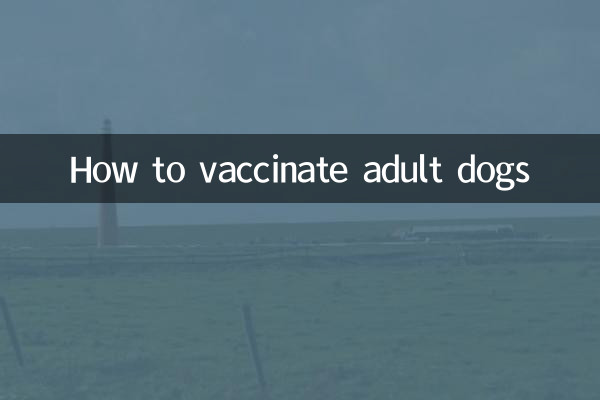How to vaccinate adult dogs
With the improvement of pet health awareness, more and more dog owners are paying attention to the vaccination of adult dogs. Vaccines are an important means of preventing canine infectious diseases, and a reasonable vaccination plan can effectively protect the health of dogs. This article will combine the hot topics and hot content on the Internet in the past 10 days to give you a detailed introduction to the vaccination knowledge of adult dogs.
1. The Importance of Vaccination for Adult Dogs

Although adult dogs have strong immunity, they still need to be vaccinated regularly to prevent diseases. Common canine infectious diseases include rabies, canine distemper, canine parvovirus, etc. These diseases not only pose a threat to the health of dogs, but may also be transmitted to humans (such as rabies). Therefore, it is the dog owner's responsibility to receive regular vaccinations.
2. Types of adult dog vaccines and vaccination time
The following are common vaccine types and recommended vaccination times for adult dogs:
| Vaccine type | prevent disease | vaccination frequency | Things to note |
|---|---|---|---|
| rabies vaccine | Rabies | 1 time per year | Mandatory legal requirements in some areas |
| Core vaccines (canine distemper, canine parvovirus, etc.) | Canine distemper, canine parvovirus, canine adenovirus, etc. | Once every 1-3 years | Adjust according to veterinary recommendations |
| Non-core vaccines (e.g. Leptospira vaccine) | Leptospirosis, canine parainfluenza, etc. | Determine based on risk factors | The dog’s living environment needs to be assessed |
3. Precautions for vaccination of adult dogs
1.health check: Before vaccination, it is necessary to ensure that the dog is in good health and has no symptoms such as fever and diarrhea.
2.Deworm first: It is recommended to complete deworming 1-2 weeks before vaccination to avoid parasites affecting the vaccine effect.
3.avoid stress: Reduce strenuous exercise or environmental changes before and after vaccination to reduce the dog’s stress response.
4.Observe reaction: Temporary loss of appetite or low-grade fever may occur after vaccination. If symptoms persist for more than 24 hours, seek medical attention.
4. Answers to recent hot questions
Based on the hot topics on the Internet in the past 10 days, the following are the issues that dog owners are most concerned about:
| Popular questions | Professional answers |
|---|---|
| Can vaccines be mixed? | Core vaccines can be injected together (such as the "six-shot vaccine"), but non-core vaccines need to be administered at an interval of more than 2 weeks. |
| What should I do if I miss the vaccination time? | Replant as soon as possible without starting the entire process again, but you need to consult your veterinarian to adjust your follow-up plan. |
| Do senior dogs need vaccinations? | Yes, but the type and dosage need to be adjusted according to the health condition. It is recommended to give priority to rabies vaccine. |
5. Common misunderstandings about vaccination
1."Adult dogs do not need vaccinations": Antibody levels in adult dogs will decrease over time, and they still need to be immunized regularly.
2."Imported vaccines must be better": The quality of domestic vaccines has been significantly improved. When choosing, you need to refer to veterinary advice rather than relying solely on the place of production.
3."Take a shower immediately after vaccination": It is recommended to avoid bathing within 3 days after vaccination to prevent pinhole infection or stress.
6. Summary
Vaccination of adult dogs is an important part of scientific pet raising. By properly arranging vaccination plans, paying attention to individual differences in dogs, and avoiding common misunderstandings, a more comprehensive health protection network can be built for dogs. It is recommended to discuss the vaccine plan with your veterinarian during your annual physical exam to ensure that immune protection is always effective.

check the details

check the details